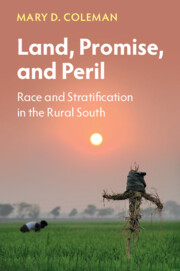Book contents
- Land, Promise, and Peril
- Cambridge Studies in Stratification Economics: Economics and Social Identity
- Land, Promise, and Peril
- Copyright page
- Contents
- Figures
- Tables
- Preface
- Acknowledgments
- Part I The Family in an Intemperate Community, State, and Nation
- Part II Family Interiority and Economic Mobility Pathways
- Part III Pathways toward Upward Economic Mobility
- 13 Beyond Caste in Higher Education
- 14 The War on Poverty and the Poor in Sunflower
- 15 What the Research Tells Us
- 16 Insights and a Valedictory
- Epilogue
- Select Bibliography
- Index
Epilogue
from Part III - Pathways toward Upward Economic Mobility
Published online by Cambridge University Press: 15 April 2023
- Land, Promise, and Peril
- Cambridge Studies in Stratification Economics: Economics and Social Identity
- Land, Promise, and Peril
- Copyright page
- Contents
- Figures
- Tables
- Preface
- Acknowledgments
- Part I The Family in an Intemperate Community, State, and Nation
- Part II Family Interiority and Economic Mobility Pathways
- Part III Pathways toward Upward Economic Mobility
- 13 Beyond Caste in Higher Education
- 14 The War on Poverty and the Poor in Sunflower
- 15 What the Research Tells Us
- 16 Insights and a Valedictory
- Epilogue
- Select Bibliography
- Index
Summary
Differences in the industrial urban economies and cities’ political receptivity to African American shares conditioned the quality of familial economic and employment transitions. When Mamma Rose first moved to Keefe Avenue in Milwaukee, formerly a bustling Irish community, there were few blacks on her block. Each summer, during our month-long visits, I noticed a change in the neighborhoods. The mom-and-pop stores disappeared along with the whites who had once dominated the area. Drugs and drug dealers were said to run the neighborhood. Only Jeremiah Missionary Baptist Church remained unchanged; it was packed to the brim. Mamma Rose and Aunt Earline, her youngest daughter, sat with the other women of the church dressed in white, from head to toe, listening to the Reverend Fred Boyd from Morton, in Scott County. Among the young, many are idle. Unemployment and low-skill levels are challenges. The closure of the key industry, Modern Line Products, in Indianola, also spurred unemployment and the citizens’ interest in looking elsewhere for employment. Work opportunities paved the way for David Williams to buy a barbershop. Alderman David Williams, Sr.’s barbershop had proved a mainstay and a place of refuge and personal pride in old age. Throughout the century, the economy surrounding them diversified, but the wages remained bare, even at Walmart and local businesses. Many unemployed youth and adults are ill-educated. Year after year, many of the schools attended by poor children performed at the bottom of the state. Most black children (born between 1944 and 1960) of the primary families (born between 1909 and 1932) who left the Delta for college, and after college, left the state to secure post-collegiate education, had the fastest exits from poverty.
- Type
- Chapter
- Information
- Land, Promise, and PerilRace and Stratification in the Rural South, pp. 385 - 388Publisher: Cambridge University PressPrint publication year: 2023



